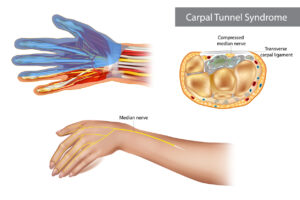FAQs About Carpal Tunnel Syndrome
Carpal Tunnel Syndrome is the result of pressure on the median nerve. This can cause pain, tingling, or numbing sensations in the wrist or fingers, and can affect your ability to perform everyday tasks.
If symptoms of carpal tunnel syndrome are affecting your daily activities and quality of life, our expert hand specialists at Seaview Orthopaedics can help you get back to activities with effective treatments and personalized care.

What are the Symptoms of Carpal Tunnel Syndrome?
Symptoms of Carpal Tunnel Syndrome may include:
• Numbness, tingling, burning, and pain in the thumb, index, middle, and half of the ring finger.
• Shock-like sensations that radiate or travel from the wrist to the thumb and index, middle, and ring fingers.
• Pain or tingling that may travel from the wrist up the forearm.
• Weakness, clumsiness, and loss of sensation in the hand.
• Decreased grip strength.
How Do Orthopedic Elbow Specialists Diagnose Carpal Tunnel Syndrome?
Carpal Tunnel Syndrome can typically be diagnosed with a simple in-office exam.
• Tinel’s sign – light tapping on the nerve to test for a tingling sensation
• Phalen’s test – a series of hand motions to test for tingling or numbness
• Carpal Compression test – pressure is applied to the wrist crease for 30 seconds to test for pain or numbness
If results of an in-office exam are unclear, your physician may request a nerve study or an Electromyography (EMG).
Schedule An Appointment with Our Carpal Tunnel Syndrome Specialists
How Do You Treat Carpal Tunnel Syndrome?
Non-Operative Treatment
- Splinting – typically worn at night, used to stabilize the wrist and reduce pressure on the median nerve
- Corticosteroid injections – reduces inflammation and swelling in the median nerve
Surgical Treatment
Carpal Tunnel release surgery is a procedure in which the transverse ligament is cut in order to relieve pressure on the median nerve. There are two different surgical techniques that may be used, endoscopic surgery or open surgery. During endoscopic surgery, a thin tube with a camera attached is used to view the structure of the wrist in order to cut the ligament. During open surgery, a larger incision is made to open up the surgery site.
Who is Likely to Get Carpal Tunnel Syndrome?
Genetics play a key role in developing Carpal Tunnel Syndrome, however there are other factors that may put you at risk.
- Wrist positioning – activities involving prolonged flexion or extension of the wrist such as typing or holding a book can increase pressure on the median nerve.
- Repetitive hand use – repeating the same hand and wrist motions or activities over prolonged periods may aggravate the nerve.
- Workplace factors – using certain tools that cause your hands to vibrate can irritate the nerve.
- Pregnancy – hormone changes during pregnancy can cause swelling within the carpal tunnel putting excess pressure on the nerve.
- Pre-existing medical conditions – those with diabetes or thyroid imbalances may be more at risk for developing carpal tunnel syndrome.
Example Carpal Tunnel Syndrome Exam
Schedule an Appointment with a Carpal Tunnel Syndrome Specialist in NJ
At Seaview Orthopaedics, we offer a full range of treatment options for Carpal Tunnel Syndrome, including on-site physical therapy. Our hand, wrist, and elbow specialists, Dr. Joseph Gower, Dr. Monika Debkowska, Dr. Kevin McDaid, and Dr. Arthur Vasen are available for appointments at our six New Jersey office locations.
Schedule An Appointment with Our Carpal Tunnel Syndrome Specialists

Meet Dr. Kevin McDaid
Dr. Kevin McDaid is a board certified, fellowship trained orthopedic surgeon specializing in operative and non-operative conditions of the hand and upper extremities. Dr. McDaid specializes in treating various conditions of the hand such as carpal tunnel syndrome, cubital tunnel syndrome, trigger fingers, wrist/finger/elbow fractures, arthritis, dupuytren’s contracture, De Quervain’s tenosynovitis, and microsurgery.

